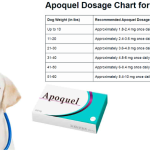If you are a dog owner, you may have heard of Cytopoint injection as a revolutionary treatment for managing chronic itchiness in dogs. But you might wonder about this new innovative pet allergy management treatment and its working mechanism. We will provide answers to all these wonders in this blog post.
Key Takeaways:
- Cytopoint injection is a medication used to manage chronic itchiness in dogs caused by allergies.
- It blocks specific molecules in the itch signaling pathway to interrupt the cycle.
- Cytopoint injection is a safe and effective treatment option, but potential side effects should be considered.
Wondered about the cost of cytopoint injection? Click here to Uncover the Cytopoint Injection Cost.
Cytopoint Injection: A Breakthrough Therapy for Dogs
Cytopoint injection has been hailed as a breakthrough therapy for dogs suffering from chronic itchiness due to allergic skin diseases. By blocking IL-31 from binding to its receptors, cytopoint interrupts the itch cycle, relieving allergic dogs.
One of the critical advantages of cytopoint injection is its long-lasting effect. Unlike other treatments that may require daily or weekly administration, a single injection of cytopoint can provide relief for up to 4-8 weeks, depending on the individual dog’s response. This makes it a convenient and cost-effective option for owners looking to manage their dog’s chronic itchiness.
Cytopoint Injection: A Breakthrough Therapy for Allergic Dogs
Cytopoint injection offers allergic dogs a secure and reliable substitute for conventional therapies that might be ineffective or have serious side effects. Its safety has been thoroughly investigated, and clinical trials have shown no significant adverse reactions or impacts on systemic immunity.
If you have an allergic dog suffering from chronic itchiness, cytopoint injection may provide the relief they need to lead a comfortable and happy life. Talk to your veterinarian about whether cytopoint therapy is right for your dog.
How Does Cytopoint Injection Work?
Cytopoint injection is a breakthrough therapy designed to manage chronic itchiness in dogs. It targets the specific molecules responsible for itch signaling pathways and interrupts the itch cycle in dogs. By blocking IL-31, Cytopoint reduces the amount of itch signals sent to the brain, relieving allergic dogs.
In contrast to conventional therapies like antihistamines and steroids, which target the symptom rather than the underlying cause, Cytopoint addresses the underlying illness and offers long-lasting relief from itching. It works fast; effects are frequently noticeable 24 hours after ingestion, and they can last up to 8 weeks.
How is Cytopoint Injection Different from Other Treatments?
Focused treatment for canine itchiness is cytopoint injection, which targets the underlying source of the problem. Other medications, such as steroids and antihistamines, inhibit the immune system or block histamine to temporarily relieve symptoms, but they don’t deal with the underlying cause.
In summary, Cytopoint injection is a safe and effective treatment option for managing chronic itchiness in dogs. Its breakthrough mechanism of action provides long-lasting relief without the risks associated with traditional treatments. Consult your veterinarian to determine if Cytopoint injection is suitable for your dog.
Cytopoint Injection: Safe and Effective for Dogs
When it comes to managing chronic itchiness in dogs, Cytopoint injection has emerged as a safe and effective treatment option for many pet owners. This innovative therapy works by targeting the specific molecules involved in itch signaling pathways, interrupting the itch cycle and providing relief for allergic dogs.
While there are potential side effects associated with any medication, the benefits of Cytopoint injection outweigh the risks. Some benefits of Cytopoint injection include its ability to work quickly, often providing relief within 24 hours, and its minimal impact on a dog’s immune system. This makes it a highly-liked option for dogs who have previously had immune-related health problems or have not reacted well to alternative forms of therapy.
When considering a Cytopoint injection for your dog, it’s important to discuss any concerns or questions with your veterinarian. They can help you know about the potential benefits and risks of this treatment option and determine if it is the right choice for your furry friend.
Cytopoint Injection: Dosage and Frequency
The typical dosage range for Cytopoint injection is 2-4 mg/kg, administered subcutaneously. The injection frequency may also vary from every 4 to 8 weeks maximum, depending on the individual dog’s response and the severity of the itchiness. It is important to note that Cytopoint is not a cure for the underlying allergic condition. Instead, it provides relief from the symptoms by blocking the itch signals for a certain period.
Cytopoint Injection: A Cost Analysis
For dogs that have a history of immune-related health problems or who have not reacted well to other treatment choices, this makes it a popular option.
While this may seem expensive, it’s essential to consider the long-term value of the treatment. Cytopoint injection can provide significant relief for dogs suffering from chronic itchiness, reducing the need for other medications and preventing secondary infections resulting from excessive scratching and licking.
The cost of Cytopoint injection may be offset by reduced veterinary visits and medication costs over time. This treatment can help improve the dog’s quality of life and reduce the overall management cost of their allergies.
Insurance Coverage for Cytopoint Injection
Some pet insurance plans can help you cover the cost of Cytopoint injections for dogs. If your insurance plan does not cover Cytopoint injection, there may be other options available to help manage the cost of treatment. Some veterinary clinics offer payment plans and financial help to make this therapy more accessible for pet owners.
Cytopoint Injection: Who is it Suitable For?
Cytopoint injection is a suitable treatment option for dogs with chronic itchiness and related skin conditions. It is particularly effective for dogs with allergies that trigger itchiness, such as atopic dermatitis. For these dogs, Cytopoint targets the specific molecules involved in the itch signaling pathway to relieve persistent itching.
Potential Side Effects of Cytopoint Injection
Although most dogs find Cytopoint injection to be safe and well-tolerated, some may develop adverse side effects as a result of the treatment. Among the most often mentioned adverse effects are:
- Vomiting
- Diarrhea
- Lethargy
- Decreased appetite
If your dog experiences any of these side effects, it’s essential to contact your veterinarian right away. They may recommend adjusting the dosage or frequency of Cytopoint injections or switching to an alternative treatment option.
Rarely, certain dogs may get more severe adverse effects like:
- A severe allergic reaction is called
- Facial swelling
- Hives or itching
- Difficulty breathing
Cytopoint Injection vs. Other Itch Management Options
While there are various options available for managing chronic itchiness in dogs, Cytopoint injection is a unique treatment option that targets the specific molecules involved in itch signaling pathways.
Unlike traditional treatments such as antihistamines, steroids, and immunotherapy, Cytopoint injection does not rely on suppressing the dog’s immune system or causing drowsiness. Instead, it works quickly to interrupt the itch cycle and provide immediate relief for dogs suffering from allergies.
Cytopoint Injections for Allergic Dogs
Allergic dogs are particularly susceptible to chronic itchiness, and Cytopoint injection is an excellent treatment option. It even works wonderfully in those cases where the pet patient has not responded to any other medication.
For dogs with chronic itching, Cytopoint injection is often a safe and valuable therapy choice, especially for allergic dogs who might not react well to other therapies. To determine if Cytopoint injection suits your dog’s needs, speak with your veterinarian.
Tips for Discussing Cytopoint Injection with Your Veterinarian
Here are the tips you need to look at for an open communication with the vet:
- Arrive ready: Bring any written questions or concerns regarding Cytopoint injection to your veterinarian appointment so you may address them beforehand. You should also be ready to provide information about your dog’s medical history and symptoms.
- Ask about alternatives: While Cytopoint injection may be an excellent fit for some dogs, it’s not suitable for all cases of chronic itchiness. Be sure to talk about other available alternatives with their pros and cons.
- Talk about any possible negative consequences: Although Cytopoint injection is usually regarded as safe; there are a few possible adverse effects to be mindful of. Your veterinarian can assist you in weighing the advantages and disadvantages of the treatment to decide if it is best for your dog.
- Think about cost: Cytopoint injection is a potentially expensive treatment option. Talk to your veterinarian about the costs involved. They can offer details on how to reduce the cost of the therapy or recommend more reasonably priced alternatives.
- Stay informed: As with any medical treatment for your pet, it’s essential to stay informed about Cytopoint injection and any updates or changes to the treatment. Be sure to ask your vet for resources or information to help you better understand the treatment and its benefits.
Conclusion
In conclusion, a Cytopoint injection is a breakthrough therapy that relieves chronic itchiness in dogs. As discussed in this article, it works by targeting specific molecules involved in the itch signaling pathway and interrupting the itch cycle in dogs. Not only is it safe and effective, but it also offers a more convenient and long-lasting alternative to traditional itch management options.
If you are considering a Cytopoint injection for your dog, it is essential to discuss it with your veterinarian. They will be able to determine the appropriate dosage and frequency based on your dog’s weight and the severity of the itchiness. Additionally, they can address any concerns or questions about the treatment.
Overall, Cytopoint injection is a valuable option for managing chronic itchiness in dogs. By understanding what it is and its working mechanism, you can make a detailed decision about the right choice for your furry friend.










